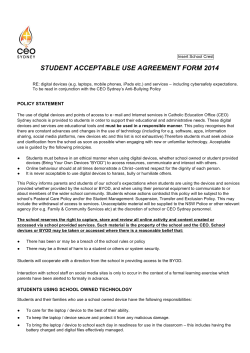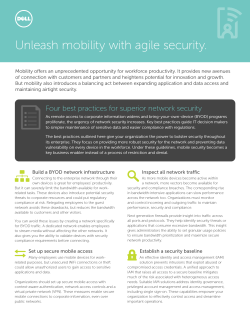
Bring Your Own Device (BYOD) : Implementation and Operations
Bring Your Own Device (BYOD) : Implementation and Operations using Microsoft Technologies WorkshopPLUS Overview • Strategic partnership: addresses the specific needs within the customer environment in terms of IT & BYOD, organizational constraints and processes / operational infrastructure architectures and business solutions. • Target Audience : Attendees of this course should be experienced users of Windows Server in previous versions. Ideally, they will have some background in Windows administration and network. No previous Windows Server 2012 experience is required. • Best-Practice Guidance: The introduction of noncompany owned devices accessing corporate resources provides unique challenges to IT. This workshop is designed to address specific challenges. This 3-Day WorkshopPLUS enable companies to address the increase in employee owned devices (such as Android, IOS, Windows, Windows Phone, …) which access the secure corporate network. With this increased proliferation of devices, we will see what strategies can the company do to minimize risk while providing services to their employees and guests. Key Features and Benefits • • • • Guidance about the current BYOD landscape Administrative policies for BYOD Technical controls to implement in a BYOD environment Tools and techniques to keep your BYOD environment safe Technical Highlights Students will hear from Microsoft Industry Experts on the challenges facing IT security teams as they always have a need to keep up to date on new devices in the marketplace. This workshop will go into many best practices in the BYOD space. Lab environment and exercise are used during the Workshop, to help student better understand how these technologies will work for them. Syllabus Hardware Requirements: This workshop requires Windows server 2012R2 that support Hyper-V and have at least 8GB of RAM. This workshop runs a full 3-days and is designed to give the IT Security team and infrastructure, guidance in strengthening and securing their environment from the threats that employees and guests bring when they are allowed to use their own devices in a corporate IT environment . Module 1: Introduction to BYOD : This module provides an overview and the unique challenges introduced by BYOD. Module 2: Active Directory Federation service : This module provides an overview on what is new in ADFS 3 and how it can helps in BYOD scenarios. Student will see how to install and configure ADFS for enabling options such as Multifactor Authentication or on how to publish an intranet website. Module 3: Intune : This module explains how to utilize Windows Intune in BYOD Scenarios. The instructor will cover Windows Intune technologies such as delivering applications and other corporate software to devices while monitoring compliance. Module 4: Web application proxy : This module explains how to publish your environment to internet in a secure and control way. Student will also see how to implement “Device Registration Service”, that increase control on data access. Module 5: Workfolders : In this module, students will learn about work folders which enable users to store and access work files on personal or corporate devices. We will cover storage and access of work files, options to maintain control over corporate data, storing the files on centrally managed file servers and specifying user device policies such as encryption and lock screen passwords. Module 6 Azure RMS : This module explains how to protect corporate confidential files and avoid data leakage. Azure RMS enables file restriction on user authentication and therefore ensure that only authorized users have access. Module 7 Windows RT & Windows ToGo : This module explains how to transform personal device into productive tools. How users, can get access to all they enterprise environment in a secure way. 2014 © Microsoft Corporation. All rights reserved. This data sheet is for informational purposes only. MICROSOFT MAKES NO WARRANTIES, EXPRESS OR IMPLIED, IN THIS SUMMARY
© Copyright 2025
















